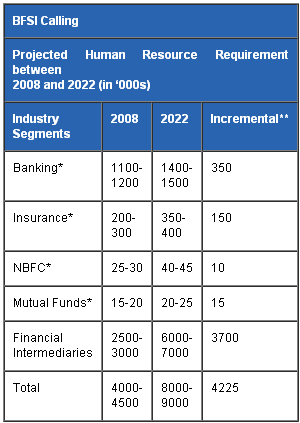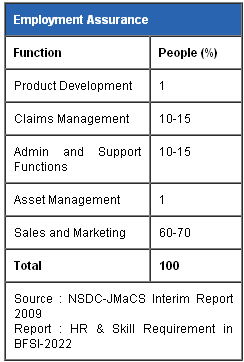Photographs: Rediff Archives Urmila Rao
Gone are the days when finance sector jobs were limited to competing for a probationary officer's post in a government-run bank. Or becoming an insurance agent at the monopolist LIC. Or toiling to be a CA or CWA.
Today, finance-related work, clubbed under the Banking Finance Services Insurance (BSFI) umbrella, offers a multitude of job profiles. Take your pick: they all come in well-crafted and defined verticals.
As MBA (in Capital Markets) student Ashish Gupta rushes off to attend his lectures for the day, the performance of bellwether stocks begins to play on his mind. This second-year student at The Narsee Monjee Institute of Management Studies in Mumbai is now focused on acclimatising himself with Money Market mantras.
Twenty-five-year old Ashish belongs to a new generation of professionals. For him, the traditional sectors like engineering, medical, hotel management, and even IT hold no charm. The BFSI has captured his fancy.
Jobs in millions
Industry experts believe that a plethora of employment opportunities will emerge at the pace at which the BSFI industry is growing. It is likely to employ 8.4 million people, according to an ICRA Management Consulting Services report. The credit rating agency ICRA stated in its interim report that "the incremental human resource requirement, between 2008 and 2022, is expected to be about 4.2 million" (view table BFSI Calling).
Titled 'HR and Skill Requirements in the Banking, Financial Services and Insurance Sector (till year 2022),' the report includes contractual employment figures too. Besides on-roll employment, contractual employment spans across all sectors through intermediaries like Direct Selling Agents (DSA), Insurance Agents, and Mutual Fund Advisors.

The finance sector gets bullish
The major segments of the BFSI -- Banking, Insurance, Capital Markets -- are abuzz with activity, which has built up since the de-regularisation in 1991. Even though the global financial turmoil of 2008 rattled the domestic BFSI a bit (due to the sub-prime mortgage crash in the US), the recovery in India was fast. The Banking and Insurance contributed 6 percent of GDP during the year ended 2008.
Atul Kanwar abandoned his media-marketing job to start afresh in this field, and IT engineer Ashish took up a diploma in capital markets. "I will make career in investment banking," he says, on his future plans. Capital markets backed by foreign investment inflows have gained traction and terms like bear and bull markets, volatility index, invest and re-deem, no longer sound alien.
A successful career in finance requires a head for numbers. While an MBA is the preferred credential for entry, even a graduate could apply for the sales and marketing function.
Read on to see a blueprint of each sector in the financial services, and the academic qualifications, and competencies that are needed to enter and flourish in each.Opportunities in providing financial services
Photographs: Rediff Archives
Ever wondered who manages the money that you deposit in the bank or invest directly in stocks and bonds? It is the financial services segment of the bank, and other stand-alone financial corporations who invest this money into a range of financial instruments, and strike a balance between debt and equity.
On a broader canvas, financial services encompass products and services offered by financial institutions in order to facilitate financial transactions and other related activities. These could be associated with loans, insurance, credit cards, investment opportunities, money management, and stock broking services. But the substantial chunk of work happens in capital markets.
Normal savings bank accounts give out very low interest for your money with fixed deposits, paying slightly higher interest rates. So, the only way to provide the customer best services -- maximum returns and added benefits -- is to invest the same into capital and commodity markets.
"Capital markets comprise of the stock exchange, stock market, and mutual funds," informs Atul Kanwar, an analyst working with Bajaj Capital. The Securities and Exchange Board of India (SEBI) is the authorised body, regulating the operations of stock exchanges, banks and other financial institutions.
Jobs for graduates, MBA graduates
The financial services sector looks for graduates with commerce, economics, finance, mathematics and a management background. Candidates start in financial advisory companies, in mutual fund houses and in stock brokerage firms. "We usually prefer post-graduates from leading business schools, with a specialisation in finance or sales and marketing," says Sunaina Matto, executive vice-president, HR, Bajaj Capital. Bajaj Capital is a distributor of investment and investment products with expertise in financial planning and investment advisory. In a mutual fund company, the function areas include sales and marketing, fund accounting, investment and research, operations and administration. You can be an advisor or a financial planner. Once you gain four to five years of experience, you can move on to be a research analyst and some years later, a fund manager. As a fund manager, you have to be apt at portfolio management skills and possess knowledge of various asset classes to take decisions on buying and selling (see table: Financial Services Sector).
One can also be an intermediary, but for that one has to clear an exam conducted by the Association of Mutual Funds in India (AMFI). Graduates with AMFI Certification can work as business development managers, relationship managers and advisors for the marketing and distribution of mutual fund schemes.
There are back office functions such as fund accounting, IT/network support also. The compliance areas in mutual funds and brokering firms also recruit candidates possessing law degree or a company secretarial degree. The job is also open to NCFM-certificated candidates, the examination of which is conducted by National Stock Exchange (NSE). Various stock exchanges such as the Bombay Stock Exchange, National Commodities and Derivatives Exchange (NCDEX), NSE, and other commodity exchanges and market entities such as SEBI and power trading exchanges also have job openings at various levels.
Opportunities galore
The total Foreign Institutional Investment inflow in equity during January to May 2010 was US$ 4.6 billion, according to ibef.org. The average assets under management of the Mutual Fund industry stood at US$ 170.46 billion for May 2010, as compared to US$ 135.58 billion in May 2009, according to the data released by Association of Mutual Funds in India (AMFI). What do these figures convey? It means that the capital markets are buzzing with action. The inflow of funds is feeding domestic businesses with capital, giving them the base to grow. Growth in markets means need for human resources. The April 2010 report of FICCI report said, there will be three-fold rise in India's capital markets by 2020.
Where you can work
As a stock broker, you may work with institutional investors as securities traders, securities analysts, advisors or dealers. Brokers also work with banks, MF, pension funds, insurance companies and other FIs or work with individual clients. Small time stock-brokers perform the combined roles of researchers, equity and investment analysts as well as that of financial advisors.
Companies depend on researchers and analysts to understand the market behaviour and make investment decisions. One division of capital market called the Equity Capital Market deals with trading shares and the other, Debt capital Market, deals with fixed income.
Companies hire equity analysts to research the market and suggest profitable investment options. The research analysts do the valuation, and track the companies' financial performance. Organisations also hire investment analysts who research, study and analyse financial reports of companies. The analysts also study market and company statistics, stock performance, assess financial results and suggest long/short-term investment options.
You can rise in the corporation to become a fund manager. They identify buying and selling opportunities,and risk return trade-off while maintaining knowledge of liquidity requirement.
The advisors or financial planners understand the financial goals of the customers. They chart out a plan of action for them, so that their financial goals can be realised.
Entering the sector
An MBA from a top institution is always the preferred entry route. Investment banking pays the highest salaries and recruits the best candidates. The job demands tremendous analytical skills, ability to understand apply stochastic forecasting techniques, and very good communication skills. Some institutions like NMMIS, also offer specialised MBA programmes focusing on the capital markets. A Certified Financial Planner is another preferred route of entry.
Trading in stocks does not require formal qualifications but a keen sense of the financial system. A basic ability to analyse balance sheets is very essential. Some renowned stock brokers do not have much qualifications, though with the changing nature of the stocks and the values they represent, a qualification like Certifed Financial Planner (CFP) would help. So if risk taking is your forte, and you can withstand high pressure and stress on a daily basis, this may be the job for you.
Job profiles: Financial services
Photographs: Rediff Archives
Expert Talk with TN Radhakrishnan, Head of HR, UTI MF
What do mutual fund managers do at work?
Q: What are the role responsibilities of an MF Manager?
A: The core responsibilities involve taking investment decisions through interactions with brokers, company officials, market players, research specialists and other sources. He has to monitor the portfolio and review the performance of funds regularly. He has to work closely with the marketing department to share knowledge on funds, schemes and portfolios, dividend schedules.
Q: Which institutions have mutual fund managers?
A: There are 43 AMCs that have mutual fund managers. Besides us, some of them are: Birla Sun Life Mutual Fund, LIC Mutual Fund, HDFC, Reliance, Kotak Mahindra, ICICI Prudential mutual funds.
Q: How long does it take for a fresher to graduate to MF manager?
A: It takes approximately 12-15 years become a full-fledged MF manager. A fresh recruit's career progression is thus: Research Analyst Senior Research Analyst, Assistant Fund Manager, Co Fund Manager, Fund Manager.
Q: What are the challenges?
A: For firms, retention at times becomes a challenge as small firms can afford to give better titles faster compared to the larger companies. In larger companies, the size of the portfolio coupled with the performance of the fund plays an important factor. Large organisations are structured and need to respect the issues related to internal parity etc.
Professional speak with Ashish Gupta, 25, PGDM (Capital Markets), Narsee Monji Institute of Management Studies, (NMIMS), Mumbai
After completing an engineering degree with an IT specalisation, Ashish decided to embark on a career in capital markets after a two-year stint in the IT industry. This helped him discover that investment banking was his true career destination. What took him so long to realise that? "As you grow and get exposed to new things in life, you see other opportunities that hold your real interest," replies the 25-year-old.
The first-year syllabus had apprised him of concepts like debt market, macro economics, corporate finance, taxation, computer application in finance among others, and it ended with an internship. "The real experience is different and enriching," says this NMIMS student, who interned with a domestic brokerage house.
"In the second year, I am getting acquainted with the basics of financial risk management, equity analysis, global capital markets, and commodity markets and trading," shares Ashish, the second-year student of MBA (Capital Markets).
Professional speak with Atul Kanwar, 32, Assistant Research Analyst at Bajaj Capital Services
For Atul, Saturday and Sundays are boring! Mondays excite him the most, when the stock markets open to a frenzied start, post the weekend lull.
The 32-year-old started dabbling in stock markets while he was in college. As a retail investor, research on financial health of companies, tracking the performance of asset classes, investing and redeeming portfolios and activities related to capital markets fascinated him.
But before taking up a profession that married his aptitude with interest, he took up 'a few wrong jobs'. Currently working with Delhi-based Bajaj Capital, he shares, "While completing management studies with a specalisation in marketing, I thought sales and marketing was the most glamorous line of work offering high salaries and a certain lifestyle."
So, as soon as his management studies were over in 2000, the MBA graduate from University of Pune headed for the US-based Turner International, a media conglomerate, and started his professional life selling distributorship to domestic media houses.
But reality dawned soon. The work wasn't as alluring as he had perceived. "I got tired of travelling and the rigour," he says. Seven years later, he enrolled at the International College of Financial Planning (ICoFP).
"I completed a two-year full-time PG Diploma in Securities Analysis and Trading," says Kanwar, who rues that institutes offering specialised studies in trading hardly exist.
Today Kanwar identifies stocks for HNI clients. He also prepares financial intelligence reports by researching the financial histories of companies. His reports are published on the company's website under the "Just Trade" section. Kanwar also pens "Stocks to Buy" -- a column for 'Investor India', Bajaj Capital's monthly magazine.
"I suggest long-term stock options, which is my area of expertise," he apprises. Finally, he feels at home.
Explore finance courses and colleges
Photographs: Rediff Archives
Here are some full-time and part-time courses and programmes you can start looking at.
The Narsee Monjee Institute of Management Studies, Mumbai
MBA in Actuarial Science (2 years)
Fees: 3.01 lakhs
Eligibility: Bachelor's degree in statistics / mathematics / engineering / economics / computer science / or allied sciences with a minimum 50 per cent marks, and 2 years of work experience.
MBA in Banking (2 years)
Fees: 4.01 lakhs
Eligibility: Bachelor's fegree in any discipline with a minimum of 50 per cent marks, and 2 years of work experience.
MBA in Capital Markets (2 years)
Fees: 4.01 lakhs
Eligibility: Bachelor's degree in any discipline with a minimum of 50 per cent marks in aggregate, and 2 years of work experience in the financial sector.
The National Institute of Bank Management, Mumbai
PGDM in Banking and Finance (2 years)
Fees: 1.75 lakhs
Eligibility: The candidate must hold a Bachelor's Degree, with at least 50 per cent marks or equivalent CGPA.
Institute for Financial Management and Research, Chennai
PGDM in Financial Engineering (2 years)
Fees: 3 lakhs
Eligibility: First class in class X, XII, and in graduation -- CAT 2010, XAT 2011, or GMAT.
PGDM in Development and Sustainable Finance (2 years)
Fees: 2.3 lakhs
Eligibility: First class in class X, XII, and in graduation -- CAT 2010, XAT 2011, or GMAT.
Asia Pacific Institute of Management, New Delhi
PGDM in Banking and Financial Services (2 years)
Fees: 3.85 lakhs
Eligibility: Bachelor's degree in any discipline with 50% marks as aggregate
Birla Institute of Management Tech., Greater Noida
PGDM in Insurance Business Management (2 years)
Fees: 6 lakhs
Eligibility: CAT 2010 + GD and PI. Minimum 50 per cent in graduation
Center for Insurance Studies and Research, National Law University, Jodhpur
MBA in Insurance (2 years)
Fees: 1.8 lakhs
Eligibility: 55% marks in the aggregate at the graduate level in any discipline
Master's in Banking and Finance (2 years)
Fees: 1.8 lakhs
Eligibility: 55% marks in the aggregate at the graduate level in any discipline
Master's of Science in Insurance (1.5 years)
Fees: 1.8 lakhs
Eligibility: Engineering graduates only. 60 per cent marks in aggregate in BE or BTech qualifying exams.
Department of Commerce, Goa University, Panaji
Master's in Financial Services (2 years)
Fees: Rs. 10,000
Eligibility: Graduates, post-graduates, and professionals like CAs, ICWAs, and CFAs with 50 per cent aggregate marks in their qualifying exams.
Department of Commerce and Business Studies, Guru Nanak Dev University, Amritsar
MBA (Honours) in Financial Services (2 years)
Fees: 1.6 lakhs
Eligibility: 50 per cent marks in aggregate at the graduate level in any discipline
Alkesh Dinesh Mody Institute for Financial and Management Studies, University of Mumbai
Master's in Financial Services (3 years; Part-Time)
Eligibility: 45 per cent aggregate in a bachelor's degree in any discipline. 3-tier selection procedure consisting of a Common Entrance Test (CET), group discussion (GD) and personal interview (PI)
National Insurance Academy School of Management, Pune
MBA in Insurance (2 years)
Fees: 2.5 lakhs
Eligibility: Bachelor's degree in any discipline with a minimum of 50 per cent marks, and 1 year of work experience.
Indian Instititute of Capital Markets
PGD Securities Markets Programme (12 months)
Fees: 1.8 lakhs
Eligibility: Master's degree or bachelor's degree with a minimum of three years duration with a minimum of 2 years of relevant work experience
National Institute of Security Markets
Certified Securities Markets Professional (12 months)
Fees: 1.7 lakhs
Eligibility: Master's degree or bachelor's degree of three years duration with a minimum of 2 years of relevant work experience
Aligarh Muslim University, Aligarh
PG Diploma in Islamic Banking and Finance (12 months)
Fees: Rs. 9,000
Eligibility: Bachelor's degree in any discipline with at least 50 per cent marks. Written admission test, interview, aptitude assessment and group discussion
Standard Chartered and Symbiosis Institute of Management Studies
Consumer Banking Graduate Training Programme (12 months)
Fees: Rs 1 lakh
Eligibility: Graduates and working professionals. Online test, group discussion, personal interview.
Indian School of Business and Finance
Post Graduate Diploma in Finance (12 months)
Fees: Rs. 2.7 lakhs
Eligibility: Graduation in any discipline. Candidates with valid CAT/MAT/XAT/GMAT scores will be exempted from the entrance test. They must appear for the personal interview.
Purple Leap and Edu Comp
Sales Management for Insurance (11 months)
Fees: Rs 95, 000
Eligibility: Graduates. Written test followed by GD and interview.
IMI and Max New York Life
Professional Programme in Insurance and Sales Management (10 months)
Fees: Rs. 1.2 lakhs
Eligibility: Graduates and working professionals. Group discussion and interview.
Indian School of Business and Finance
PG Diploma in Financial Planning (8 months)
Fees: Rs. 1.3 lakhs
Graduation in any discipline
NIIT and IFBI
Post Graduate Diploma in Banking Operations
Fees: Rs. 75,000
Eligibility: Graduates. Test and interview.
Religare and Manipal
Certificate Programme in Commodities (3 months)
Fees: Rs. 18, 000
Eligibility: Graduate from any stream. CV short listing, group discussion, and personal interview.
NIIT Uniqua (Joint Venture with Genpact)
Certificate in Finance and Accounts (4 weeks)
Fees: Rs. 10, 150
Eligibility: BCom, Voice Assessment, and Finance Assessment Test
National Institute of Securities Markets (SEBI)
Certificate in Financial Engineering and Risk Management (300 hours)
Fees: Rs. 1.5 lakhs
Eligibility: Graduates from any recognised Indian university. Work experience is preferred.
NIIT and IFBI
Diploma in Banking and Financial Services (125 hours)
Fees: Rs. 35,000
Eligibility: Graduates must appear for test and interview
NCDEX Commodity Professional Programme
National Commodities and Derivatives Exchange (50 hours)
Fees: Rs. 15,000
Eligibility: Graduate from any recognised Indian university. Work experience preferred.
NCDEX Commodity Certificate Course
National Commodities and Derivatives Exchange (45 hours)
Fees: Rs. 2,750
Eligibility: Graduates from any recognised Indian university. Work experience preferred.
Get familiar with financial jargon
Photographs: Rediff Archives
Annual report
The annual report is a write up on a company's activities, its achievements and challenges in the financial year concerned. It helps analysts make an assessment of the company's health: when read along with the balance sheet.
Balance sheet
A firm's financial statement that every company must publish annually. It provides a picture of the firm's assets, liabilities and net worth at a specific time.
Buy-and-hold
A strategy in which the stock portion of one's portfolio is fully invested, including dividends reinvestments etc., at all times.
Cyclical industry
An industry whose success is closely linked to the general economy's rise and falls and has periodic ups and downs.
Debt-to-equity ratio
It is the ratio of long-term debt by the equity (all assets minus debts) held in stock. It indicates the financial health of a company.
Dividend
A sum of money, paid to individual shareholders of a corporation out of earnings after tax and interest payments.
Earnings per share
Earnings calculated by dividing the net income of the company by the number of outstanding shares.
Fundamental analysis
An analysis of stocks based on fundamental factors, such as company earnings, its competitiveness etc., to determine a company's worth, potential for growth.
Going public
An expression used to describe the first public selling of shares of an institution that previously sold shares privately.
Market capitalisation
The value found by multiplying the number of outstanding common stock shares by the share price; indicates firm size and total value held in stock in the stock exchange where it is listed.
Net worth
Value found by subtracting all liabilities from all assets. This provides a clear value for the company.
Price-earnings ratio (P/E)
The ratio found by dividing market price per share by earnings per share.
Private corporation
A corporation which does not offer stock for public sale, and its ownership rests in the hands of the promoters.
Public corporation
A corporation which offers stock to public and hence is required by law to provide information about its financial conditions, growth potential etc.
Profit margin
The margin found by dividing a firm's post-tax net earnings by sales.
Prospectus
The written statement disclosing the terms of a mutual fund or the offering of securities.
Return on equity (ROE)
The value found by dividing the company's net income by its net assets.
Risk/return trade-off
A rough measure used by traders to assess their quantum of income possibility vis- -vis the risk of losing the investment. Generally higher the risk, higher is the returns.
Technical analysis
The analysis of historical trends of price, volume, and other market indicators that aid in predicting future trends.
Valuation
The process of determining the current value of stock or other assets.
Yield
The quantum of returns that accrues any investment vehicle offers
Careers in Insurance
Photographs: Rediff Archives
When the HDFC job offer came, I couldn't refuse," says Economics student Taruna Thadani who graduated from Atma Ram Sanatan Dharma College, Delhi University in 2010, and was offered a job by HDFC Life Insurance. "It was, after all, a brand," says the 20-year-old, who was enamoured by the offer, and is now pursuing an MBA from Symbiosis Institute, Pune. Whether she would display the same sentiment had the offer came from any public sector insurer, is doubtful.
Private players brought cachet and multiple job options to the otherwise drab sector. Before they joined the fray, there was a time when the insurance industry was tightly regulated, with just a handful of public sector insurers. But till today, the homegrown LIC remains the largest entity in the life insurance segment. According to a recent ICRA report, LIC contributed 74.39 percent to the total life insurance premium collected. Regulatory body IRDA states, it is growing at a rate of 15-20 percent. Together with banking services, insurance services add about 7 percent to the country's GDP.
The ABC of insurance
Insurance is a contract between an insurance company and you, wherein you agree to pay a sum of money (called premium) to the company (the insurer) who provides you (the insured) or your insured items, financial protection from uncertain events. The uncertain events could be loss/ damage of health, auto, property, or life. When you pay a premium, you are basically generating a pool of funds from which you can claim at the time of any untoward incident. And the frim makes money if the claims are less than the premiums made.
Insurance has two sub-segments: life insurance and general insurance. Life insurance provides protection and financial stability to beneficiaries financially, in case the owner of the policy dies. Under this segment there is term life insurance, and there are other options. Under general insurance, most companies offer products like home insurance, car, auto, fire, burglary, travel, liability and health insurance. Health insurance and automobile insurance are the other two major segments in general insurance that is expanding.
According to RNCOS reserach report: The Indian health insurance market recorded growth in the last two fiscals (2008-09 and 2009-10). As per the company's estimate, the health insurance premium is expected to grow at a CAGR of over 25 percent for the period spanning from 2009-10 to 2013-14.
 Assurance in marketing
Assurance in marketing
Taruna started out selling insurance policies and recruiting financial consultants (agents) for HDFC Life Insurance, soon after the company trained her and her batch of 20 during the course of the two-month period.
"The marketing function plays a pivotal role in establishing company's credentials and in branding," says Judhajit Das, Chief HR, ICICI Prudential Life Insurance Company. Life insurance as a product is rarely bought. Therefore, insurance companies have to aggressively sell it. Ergo, companies maintain a strong distribution channel and a dynamic marketing division. So, it is small wonder that marketing employs maximum number of people (see table: employment assurance).
The life insurance sector employed 0.3 million people directly and 2.9 million people as individual agents in 2008 09, says www.ibef.org, a website run by the Ministry of Commerce and Industry and the CII, jointly.
Insurance job profiles
Apart from agents and advisors who require basic knowledge in insurance, finance and selling skills, the sector demands employees with specific skills. CAs and MBAs are involved in product development, management, marketing and asset management. Asset handling requires the professional to have an apt understanding of risk appetite of the company, its liquidity requirements besides possessing the ability to determine a proper asset mix. This function is allocated to portfolio managers.
Graduates and below join Claims Management, Operations and Sales functions. The administrative side has people with a flair for documentation, and IT professionals troubleshoot for IT-related glitches (see table: Insurance Sector). Actuaries are highly skilled, and are responsible for product development and pricing.
This is another key function, where you are responsible for designing customer-friendly products catering to a person's needs such as health, wealth and retirement. "They are also responsible for product pricing and product profitability," says Judhajit. The other divisions in the sector are product development, asset management, and operations. But all demand a healthy passion for risk.
Make a career in banking
Photographs: Rediff Archives
Software entrepreneur Roshan's liquid assets are worth Rs. 5 crores. This makes him a High Networth Individual (HNI), entitled to privileged banking services at his bank, a prominent private sector bank in India. His account is managed by wealth manager Sachin Khare, whose job it is to ensure that Roshan's assets remain safe, and grow.
Sachin does so by strategising and advising his clientele on investment options and tax-planning. Taking into account Roshan's financial goals, Sachin will draw up a financial plan for him, working with his distinct asset class such as equities, real estate, fixed income and others, and provide taxation, legal and risk management advice.
A decade ago, such a job profile position may not have even existed in India! This is because for a long time, banking was a public sector affair, wherein the canvas was staid with limited job opportunities and jobs mostly at Grade 4 levels, i.e. as a clerk or a teller, and of course, at the more prestigious probationary officer's positions.
One entered the bank at either of these two levels and spent entire careers in the same bank. Enterprising candidates moved to development banking institutions like IFCI or IDBI, which focused on funding large projects.
But with liberalisation and entry of private banks, the scenario changed. Banking became the fulcrum of economic growth, and diverse segments like treasury, wealth management, retail banking, commodity futures and options, and cash management services came into being. The nature of banking too as changed. ATMs, credit cards, tele, mobile and net banking services have made banking easier and cost-effective for the urban populace. These new verticals are drawing a large number of working professionals.
For example, with the unprecedented growth in corporate income and a corresponding increase in income, wealth management as a segment is leading to ample job opportunities in banks. "For wealth management providers, India continues to be an important market," says Atul Singh, Head, Merrill Lynch. According to Merrill Lynch Global Wealth Management and Capgemini Annual World Wealth Report, June 2010, the High Net Worth Individuals; (HNI) population in India grew to 50.9 percent in 2009.
The verticals
It was in 1969, that banks were nationalised under the Banking Companies (Acquisition and Transfer of Undertaking) Bill. The early 1990s saw opening of a few private banks. Another milestone in the banking industry came in 2004 when Foreign Direct Investment (FDI) was increased to up to 74 percent. The FDI relaxation gave a major boost to the sector, creating unprecedented job opportunities.
A commercial bank, like Yes Bank for instance, has a wide-ranging bouquet of products. "We offer corporate, retail and SME banking across business lines like financial markets, investment banking, corporate finance, branch banking among host of others," says Deodutta Kurane, President, Human Capital Management, YES BANK.
The verticals are supported by three functions: sales and marketing (new business generation, relationship management), operations (customer service, risk management, branch operation) and support functions (HR, legal, IT, Audit).
The operations division generates maximum employment opportunities. A major percentage of employees, 55-60 percent, are employed in operations, states JMaCS Analysis.
How to get in
The largest entry point still is the competitive examinations banks conduct for both clerical level entry and the probationary officers (PO) exams. The PO is equivalent to the management trainee's position in the corporation. Normally banks put a fresh MBA through a two-year period wherein the candidate spends an equal amount of time on all aspects of banking. In most banks the CEOs are invariably from the PO ranks. For example, K. Vaman Kamath, Chairman, ICICI Bank Ltd., began as a probationary officer.
Of late, the private and now even State Banks, scout for talent from B-Schools such as the IIMs, ISB, XLRI, MDI, SP Jain, IIFT and other A-category schools. A significant number of fresh recruitments are for relationship segments in operations, hired for business units like Institutional banking, commercial and corporate banking. Banks also recruit fresh talent off-campus and generally use channels like direct applications, job referrals and search firms. Yes Bank prefers candidates with work experience. "Our experienced to fresher hiring ratio is 4:1, respectively," says Deodutta.
Career progression
A fresh MBA usually starts as manager (sales/operations) and moves on to specialised roles like managing or heading verticals at a bank. Graduates with up to two years of work experience work as Assistant Manager (sales) or (operations) in sales, customer service and desk operations. With 5-7 years of experience, some occupy senior managerial positions, before scaling to VP designation when 10 plus years of work experience has been acquired. Skilled category professionals like CA, CS, and CWAs usually work in departments like treasury, credit, risk and corporate banking. Some with exceptional skills also move into investment banking.
Those who are not interested in working for a bank or other financial institution can seek out opportunities in outsourcing companies. According to Indian Banking Association (IBA), the banking industry's outsourcing size is Rs 4.08 billion and is expected to grow further, generating significant employment opportunities.
From high-risk spot and futures trading to teller functions, banking has a job to suit diverse temperaments. All one needs is a flair for numbers and good interpersonal skills.
Expert talk with Deodutta Kurane, President, Human Capital Management, Yes Bank.
He shares what the bank seeks in a new recruit.
Q: What are the function areas for which recruitments are done off-campus and what is the medium used?
A: A majority of our lateral hiring for all functions takes place off campus. The media used are direct applications, job referrals, and internal job postings for specific positions/locations and selective search through leading search firms. We also provide internal job rotation opportunities to high performing/high potential executives for select functions/roles in the bank.
Q: How many campus recruitments were done in 2009?
A: Last year Yes Bank hired a total of 150 executives for product functions like transaction banking group, financial markets and commercial banking. The other verticals where a significant number of students were hired were risk management, branch banking and operations and service delivery.
Q: What qualities do you broadly look for in a candidate while hiring?
A:Yes Bank primarily aims at acquiring candidates who have completed their two years full-time MBA programmes. Candidates with a work experience in a Banking/NBFCs/ITES industry are preferred over freshers. We primarily focus on students who possess a strong academic background and an analytical frame of mind. Being good with numbers and a sound knowledge about the banking industry along with comprehensive knowledge about Yes Bank is a standard requirement.
Being a successful actuary
Photographs: Rediff Archives
EXPERT SPEAK: "There's no escape from hard work"
Rajendra Shah, MD
DS Actuarial Education Services, Mumbai
Opportunities for actuarial science students exist in various fields of the financial sector such as life insurance, casualty insurance, property insurance, health insurance; reinsurance, calculation of retirement benefits, asset and liability valuation, pricing of securities and derivatives, risk assessment, risk management and so on.
The subject of actuarial science has derived its roots from mathematics, statistics, economics, and finance. To become an actuary, one has to be a member of the actuarial professional body called the Institute of Actuaries of India. In order to be an associate member one has to pass Class 12 examinations, and for a fellow membership one has to pass three more examinations and possess specified work experience.
University programmes are available after Class 12 for Bachelor's Degree and after graduation for Master's Degree. Many universities too offer full-time actuarial science programmes for degrees at both undergraduate and post gradate levels. Some open universities too have designed and developed degree level courses in the same domain. But being a math intensive curriculum a full time option is always preferable. So, at times, many students opt for regular training at institutions even while pursing a correspondence degree.
To succeed in this career; one needs to work very hard, and with sincerity and dedication. A good business sense and razor-sharp common sense are essential traits of successful actuaries.
The job opportunities are better than other regular sectors in India and abroad. graduates or post-graduates may begin with a salary of Rs. 20,000 to Rs. 50,000 per month and an associate actuary can earn Rs. 20,00,000 or more per annum.
PROFESSIONAL SPEAK: "For the love of number crunching"
"I decided to join the actuarial sciences field because this was the only area where I could put my mathematical skills to optimal use," says Mumbai-based Hiren Parmar. The 26-year-old majored in mathematics, but chose not to pursue higher studies with it.
"I wanted to do something in the real world," he says, hinting at the lack of job scope for those with a master's in mathematics. So, Hiren joined a PG Diploma in actuarial science and completed it in 2007, followed by a master's in it.
He obtained a master's degree in 2009, and alongside, cleared seven out of the 15 examinations administered by the Institute of Actuaries of India, a professional body. The exams are conducted twice, in May and in October, and in November each year.
Hiren's induction at his current firm, UK-based Jardine Lloyd Thompson, comprised of a telephone interview first and later a written communication test, and technical interview.
Now, working as an actuarial analyst and drawing up valuations, he is a happy soul. And why not, when salaries range from Rs 3.25 lakhs to 4 lakhs per annum at the entry level: it's a happy combo offer. And with packages touching 20 lakhs and above with experince, the deal can only get better.
Get, set, go: Becoming job ready
Photographs: Rediff Archives
The recession in 2008 is a distant memory away now, and the stock markets have almost reached their previous record high valuations. The financial sector is right now back from the brink, though global indicators are still far from satisfactory. But everybody agrees the worst is behind us.
So is the job market hot? Well, recruiters look at a combination of factors like articulated communication, presentation skills, overall personality, and the candidate's basic knowledge of the industry.
They also test networking abilities and negotiation skills before inviting them on-board. For prepared candidates, opportunities do exist. But the million dollar question is -- why is that after two years of a gruelling PGDM programme, students are still not ready to start work right away?
Are you job-ready?
"Not quite ready" is a common refrain. The course curriculum followed by academic institution provides the required knowledge inputs in management subjects like finance, marketing and HR. "What it lacks is a vocational or industry focus," says Judhajit Das, Chief Human Resources, ICICI Prudential Life Insurance Company.
Krish Lakshmikant, a leading headhunter seconds that. The students do not apply their minds sufficiently and are just not ready to roll up their sleeves. The while collar AC room job mentality still persists, he says. And corporations invest in costly training structures to get them job ready.
Fresh hires at Yes Bank undergo formal and intensive 5-week induction and on-board programmes. "We give them insight into the company's philosophy, culture, and our diverse business verticals and structure", says Deodutta. Post that, the recruits are given on-the-job training and are exposed to 4-5 key support functions right at the inception stage. Similar induction programmes are conducted in insurance and financial services sector too.
Where is the moolah?
In the insurance and banking sectors, entry-level salaries for MBAs range between Rs 5-8 lakhs per annum. Capital markets pay Rs 2.5 lakh or more for a sales and marketing function.
The entry-level salary band starts at Rs 1.5 lakhs per annum, varying city-to-city and the B-School the students come from. The highest salary in 2009 was Rs. 18 lakhs , while the average was Rs.10.20 lakhs, says Dr. Anupam Rastogi, Senior Prof. (Finance Economics), NMIMS.
Skilled employees start higher, and the salaries are more if a professional exam has been cleared by a candidate. "Typically associate actuaries earn Rs. 20,00,000 plus pa and fellow actuaries Rs. 40,00,000 plus pa," says Rajendra Shah, managing director, DS Actuarial Education Services.
Sounds like music to your ears? Then BFSI is your symphony indeed!










Comment
article